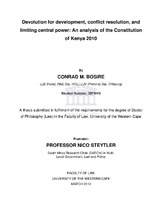| dc.description.abstract | State practice and literature suggest that devolution of power can address the main challenges of underdevelopment, internal conflict and abuse of centralised power in developing states. However, this thesis advances the argument that the design features of devolved government for these purposes are not always compatible. Accordingly, while there are complementary and neutral design features in the three designs, trade-offs have to be made between the unique design features in order to ensure the effective pursuit of the three purposes through a single system of devolved government. Kenya, the case study for this inquiry, confirms the international trend as its major challenges over the last 50 years have been underdevelopment, internal conflict and abuse of central power. As such, development, ethnic harmony, and the limiting of central power featured prominently throughout the entire constitutional review process as purposes to be pursued by means of devolution of power. To this end, the devolution of state power is one of the central elements of the current constitutional dispensation in Kenya. There are trade-offs made in Kenya‟s devolution design in order to accommodate the three purposes of devolution. However, the overall result has been that the emphasis falls on development at the expense of conflict resolution and limiting central power. Nevertheless, regardless of the trade-offs and nature of the final design, the design‟s effectiveness or lack thereof may depend very much on factors external to the design. Lack of political will to make devolution work can negate the effectiveness of even the most perfect design; by same token, political will could make an apparently bad design effective. In practice, therefore, effectiveness depends on an array of other context-specific factors. | en_US |

